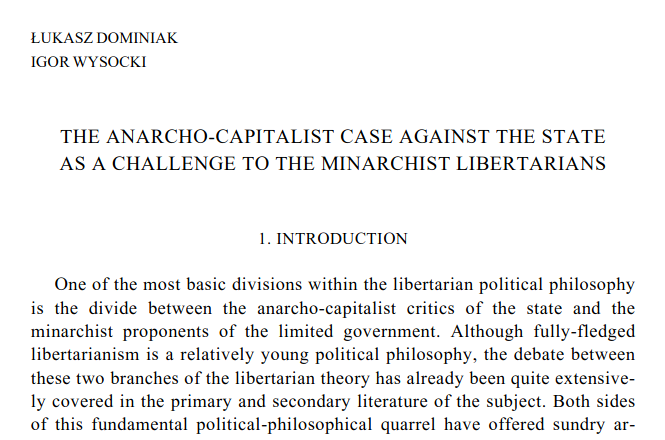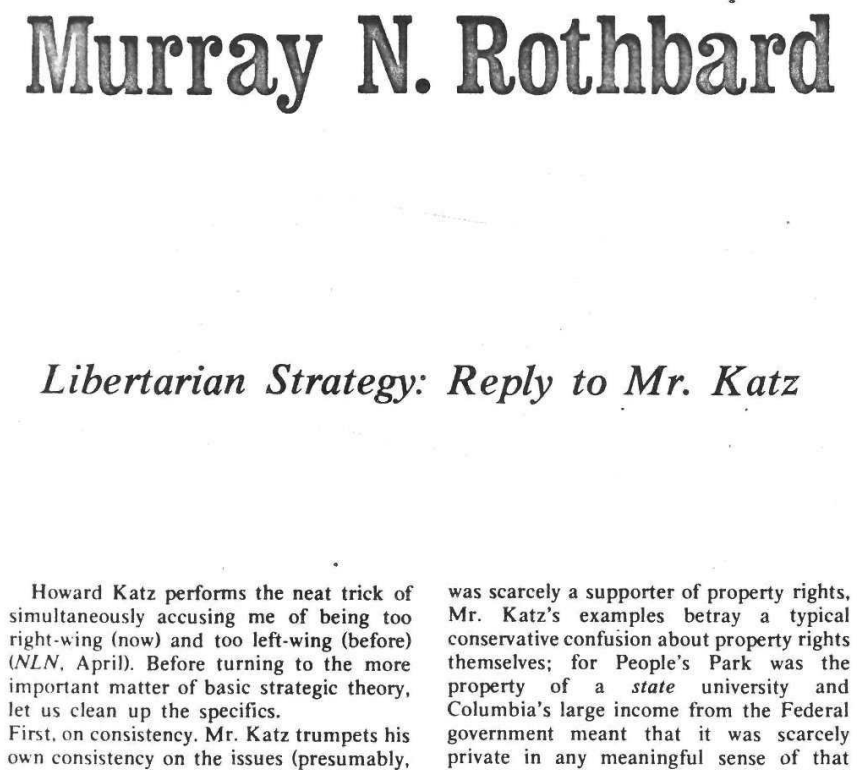Bryan Caplan debates Yaron Brook on anarcho-capitalism. You can safely skip Yaron’s parts, but Bryan’s part are golden.
Tag Archives: anarcho-capitalism
Dominiak and Wysocki on minarchism
review of the Anarchist Handbook

Michael Malice‘s book The Anarchist Handbook is a collection of essays from anarchists of many varieties, each introduced by the author. Ancaps looking at the rest of the present-day anarchist movement might conclude that there is nothing to learn. However, it is instructive to see how close the idols of other anarchist philosophies came to libertarianism, and how their errors led to things like anarcho-socialism, anarcho-communism, and the like.
Malice, of course, includes some of the best essays in anarchist thought. Featured are Lysander Spooner‘s “No Treason #6“, an excerpt from David Friedman‘s “The Machinery of Freedom“, and the entirety of Murray Rothbard‘s “The Anatomy of the State“.
Continue readingReview of Seasteading by Joe Quirk
 Joe Quirk‘s book Seasteading is a valuable addition to your ancap library. It explores the potential of the ocean to solve some of the world’s greatest problems. While written for a mainstream audience, it has a solid anarcho-capitalist undertone, referencing Patri Friedman, Milton Friedman, and Bryan Caplan.
Joe Quirk‘s book Seasteading is a valuable addition to your ancap library. It explores the potential of the ocean to solve some of the world’s greatest problems. While written for a mainstream audience, it has a solid anarcho-capitalist undertone, referencing Patri Friedman, Milton Friedman, and Bryan Caplan.
This book is also recommended for ancaps because of its purely capitalist approach to solving problems. In short: privatize the ocean and develop business models that make use of its enormous untapped resources.
It is often corny, wasting no opportunity to use terms like blue-topia, aqua-preneur, etc. However, the humor often hits the mark. For example, when Quirk talks about “politicians embracing their kinship with pondscum.”
The book is highly business oriented, discussing real people doing real work right now. It tells of some of the latest Continue reading
Review of What is Anarchism? by Donald Rooum
 Donald Rooum’s What is Anarchism? is a mishmash of excerpts from a small range of anarchists combined with seemingly unrelated cartoons. The prose are equally incongruous, often relating irrelevant stories or showcasing parts of longer books and essays that are useless out of context.
Donald Rooum’s What is Anarchism? is a mishmash of excerpts from a small range of anarchists combined with seemingly unrelated cartoons. The prose are equally incongruous, often relating irrelevant stories or showcasing parts of longer books and essays that are useless out of context.
Some of the chapters are worthwhile reads, and even the bad ones have the occasional gem that gets to the heart of anarchism. But the book as a whole is a confusing mess. There is no theoretical foundation, or common thread that binds the various parts together. Instead, it piles on every idea that has ever associated itself with anarchism, such that anyone who finishes reading the book is sure to wonder, “what is anarchism?”
Anarcho-capitalists may still find the book useful or entertaining, as they already know what anarchism is and are unlikely to be led astray. It could also be interesting to those ancaps who Continue reading
The Weapon Shop by A. E. van Vogt
 A member of both the Science Fiction Hall of Fame Vol. 1 and the Prometheus Award Hall of Fame, The Weapon Shop is short story that anarcho-capitalists will love.
A member of both the Science Fiction Hall of Fame Vol. 1 and the Prometheus Award Hall of Fame, The Weapon Shop is short story that anarcho-capitalists will love.
Though it was published in 1942, the sci-fi aspects of the story have aged very well. More importantly, the libertarian themes continue to be strong and relevant, even though libertarianism itself has evolved over the same period from classical liberalism, to minarchism, to anarcho-capitalism.
You can read the short story here (epub, mobi), though the audible version is recommended if you like audio books.
Spoilers below.
Libertarian Strategy: Reply to Mr. Katz
Murray Rothbard was a prolific writer. Thanks to the Mises Institute, much of his work can be found online, but there are still many articles that anarcho-capitalists have never read because only physical copies exist. For one such article, that changes today.
Simon Franek sends along this article that he found in the FEE archive. It is from the May 1973 edition of New Libertarian Notes. Click the image below for the PDF.
Review of Libertarian Quandaries
 Jakub Wisniewski‘s book Libertarian Quandries is a thoughtful and accurate account of the libertarian ethical system. Though the language is a bit academic at times, the chapters are short and pithy. This makes the book an excellent choice for those who are familiar with libertarianism and want to take their understanding and arguments to the next level.
Jakub Wisniewski‘s book Libertarian Quandries is a thoughtful and accurate account of the libertarian ethical system. Though the language is a bit academic at times, the chapters are short and pithy. This makes the book an excellent choice for those who are familiar with libertarianism and want to take their understanding and arguments to the next level.
Wisniewski addresses a wide range of objections to libertarianism, be they economic, ethical, or simply a question of what is practical. Similarly, he mounts a calm but relentless attack on arguments in favor of government. Ancaps will appreciate his consistent anarchist message, while libertarians who are still holding on the idea of limited government will find some interesting food for thought.
That said, there are a few things that call for clarification: Continue reading
Anarcho-capitalism is not Right Libertarianism
 Some like to describe ancaps as alt-right or right-wing libertarians. The reason is that in the American political spectrum, right-wing politicians occasionally use rhetoric that is somewhat close to what an ancap would think and say. For example, the technically-true but misleading “taxes are too high” or an insincere variant of “property owners should get to decide how to use their property”.
Some like to describe ancaps as alt-right or right-wing libertarians. The reason is that in the American political spectrum, right-wing politicians occasionally use rhetoric that is somewhat close to what an ancap would think and say. For example, the technically-true but misleading “taxes are too high” or an insincere variant of “property owners should get to decide how to use their property”.
With friends like that, who needs enemies? Yet, the American-left’s hysterical call to follow Venezuela into the 9th level of hell is so abhorrent that Continue reading
Review of A Spontaneous Order: the Capitalist Case for a Stateless Society
 In his book, A Spontaneous Order: The Capitalist Case for a Stateless Society, Chase Rachels does an excellent job conveying insights from both libertarianism and economics. He uses clear explanations of basic concepts and persuasive examples for applications. He relentlessly identifies aggression as the root cause of society’s problems, and the state as the primary source of aggression. Most importantly, the book is permeated by a Rothbardian hatred of the state, which will make it an enjoyable read for any ancap.
In his book, A Spontaneous Order: The Capitalist Case for a Stateless Society, Chase Rachels does an excellent job conveying insights from both libertarianism and economics. He uses clear explanations of basic concepts and persuasive examples for applications. He relentlessly identifies aggression as the root cause of society’s problems, and the state as the primary source of aggression. Most importantly, the book is permeated by a Rothbardian hatred of the state, which will make it an enjoyable read for any ancap.
Rachels makes frequent use of long passages quoted from other works. Thankfully these are drawn from some of the best sources on libertarianism and economics: Continue reading


